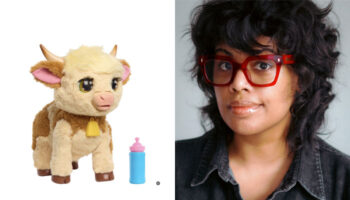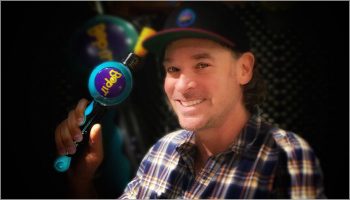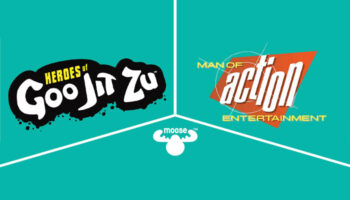Inventor Dan Klitsner interviews Deej Johnson about writing rules, creating magic – and bottling objects!

Deej, I’m excited to be interviewing you because you know lots about inventors, but we don’t know a lot about you! So, my first question for you is, what is 512 x 2423?
I have no idea! Maths, along with geography, history… Well, name any subject other than English and I’ll flounder!
It’s 1,240,576. That’s the number of words you’ve written about us inventors.
That’s a bloody good hook to start an interview with, Dan!
It’s around that number.
It feels about that!
Ha! Well, they’re fascinating interviews. It’s always interesting to hear about peoples’ process. And when it comes to hit products or number one songs, it’s often not solely about the creative process: it’s the serendipity of a lot of other things…
Absolutely. I’d imagine the real secret of the pro inventors is that they have – and pitch – LOTS of ideas… They just keep going.
Now, one thing that I’m sure many inventors are unaware of is that you are indeed an inventor as well – but as well as games, you create magic tricks! Tell me about your work in this space… Why does it interest you?
Well, I’m not on a recruitment drive because a lot of magicians are quite hard work! But I do believe that if you want to make yourself think in a way that most people don’t, you should take up magic! Nobody thinks like a magician thinks… And I mean magicians that invent magic tricks. Mark Setteducati is a great example in this industry; Jim McCafferty too…

Yes, there are quite a few toy inventors that are magicians, so clearly there’s a connection between the two areas. What do you think it is?
I absolutely believe that inventing magic trains your brain to think differently – and that’s a gift for toy and game inventors. You’re starting from the position of asking: ‘What’s impossible?’ You’re not immediately restricted by the laws of physics when you invent a magic effect. It’s such a shift in the paradigm of how we usually see the world.
Beyond that, magic can’t just appear to be impossible – it has to be entertaining; fascinating and maybe funny… That gives you limitations, and that’s a useful creative technique. Personally, I also think you have to marry the trick to a theme; something that a lot of toy and game inventors have to do too… Work out what theme best suits gameplay or a toy mechanism. So understanding and inventing magic tricks does, I think, fundamentally make you think very differently – and very usefully.
It makes so much sense. There are so many similarities between the two crafts. One step along from inventing magic tricks is creating ‘impossible objects’, which you also do. For anyone that hasn’t seen one before, how would you describe an impossible object?
These are real objects that theoretically can’t exist! Unaltered glass bottles that contain things that are too wide to fit into the neck: padlocks, toys, or scissors for example… Or this! This is a playing card with a hole in the middle. Then that card is hung on the handle of the scissors that started the hole! If you were here, you could keep this; you wouldn’t find slits in the scissors or cuts or tears in the card. Again, impossible objects really make you think…

How did you get into this?!
Oh, out of sheer perversity! The first one I did came about because I was going to speak at an event. I thought – as a writer and creative consultant – giving out a normal business card felt like it lacked creativity! I figured it’d be good if everyone in the audience went away with an impossible object… So I thought I’d put some golf balls in jars but – of course – the golf balls would be too wide to go in or out…
How many were in the audience?
Oh… 100, 150. I forget. But I had ‘Stuck for Words?’ printed on some golf balls and put them inside these little jars. The worst part was that there wasn’t time to source empty jars! So I had to buy 150 jars of baby food and empty the bloody things – ugh! The smell! It was horrendous!
Amazing! 150! And what spurs you on to take on these projects?
I just want to do things that I find interesting and fun. And when somebody suggests something to me that they think it would be interesting and fun to do, I usually shrug and say: “Yeah, if you like, I could have a look at that.” I’ve said before, everything interesting I’ve ever done in my life, I’ve done with a shrug. From the first magic show I did and these bottles to scripts for performers, video scripts, books, speeches, stuff for Mojo… I’ve had no burning desire to do any of those things, or speak to anyone, or to invent anything or create something specific…
That said, I shouldn’t be surprised to discover those things – almost exclusively – have turned into the most profoundly moving, important, exciting, fascinating things… If I’d known at the time what a journey these shrugs would send me on, I wouldn’t have shrugged; I would’ve danced with joy.

That’s an optimistic approach. You assume something good will come by saying yes, even with a shrug. Now, I also wanted to ask how you came to start writing for Mojo? How did you meet Billy and Adam?
Max Ford – Ooba Toys – had arranged to do a brainstorming session to which I’d been invited via a mutual contact. Billy had also been invited. We both went along, and it was lovely, but Billy and I really got along. We howled with laughter for most of the session. Some time later I was hosting a Bananagrams school challenge. The organiser was looking for adjudicators and asked me whom we should approach. I said: “Who was the guy at that brainstorm that time? I got on well with him!” But in truth it was also because I saw him act with great integrity and kindness and generosity of spirit the entire day.
This was before Mojo?
Right. Back then Billy was still the editor of ToyNews. Sure enough, he was a delight at the challenge event. Got the work done, made me laugh… So we stayed in touch. When he founded Mojo with Adam Butler, I could see they’d make a force to be reckoned with. Eventually, Billy asked me to do some stuff for them. To some degree, we’re now inseparable… Not least of all because poor Adam does all the work! Billy and I walk around and talk to people; we get all the credit! Ha!
And did you want to be a writer when you were younger?
No, and given my interest in language now, it’s hard to see how that escaped me at school… But the things that were put in front of me didn’t seem relevant. I started to write because people around me needed help with things – one friend made short films; one was a musician… Then there was a comedy-magic duo. They had no scripts… Like I say, I shrugged and started writing for these people. Also, through my more serious job in logistics back then, I came to realise you could do a great deal with language: persuade people, cheer them up, make them laugh, stick up for them, make them feel valued…

When I left logistics, I studied hypnotherapy. That’s when language stopped being interesting and became remarkable. You can help someone cure a phobia or stop smoking or gain confidence, process trauma, lose weight… I jumped all in on that – language is an extraordinary tool… Today, it all makes for very varied work. Interviewing gorgeous people in the toy industry requires a very different use of language than writing for a client about parasitic worms…
Speaking of your writing, I’m honoured that you’ve recently asked me to write the foreword to a book you’ve written about game rules. What can you tell me about that?
Well, part of the reason I got into the toy and game industry is that Rena Nathanson – the co-inventor of Bananagrams – asked me to look at the packaging tag for that game. And to research that, I would watch to see how people interacted with the game in retail stores… I would see people drawn to that pouch; they’d pick it up and they’d scrunch it… Feel the quality, the heft of it… Then they’d open up the swing tag and put the game straight back down!
The swing tag was off-putting?
Hugely! Because it was a summary of the rules, not a representation of the fun! So now, for me, the front of any pack needs to grab attention, the back needs to SELL you the game… And the rules need to explain how to play. There can be a crossover, but I feel those things must happen in that order. That was the problem with the Bananagrams tag: the rules were a barrier to sales…
Beyond that – to go back to the book – I also think badly written rules are a barrier to fun… Fun that buyers have already paid for, which can be bad for the reputation of a game. So writing succinct rules is really important, and it’s how I came to be working in the industry – but I don’t think there’s a tremendous amount of advice out there on the subject.

Are there traps inventors fall into when writing rules?
Yes, definitely… Inventors know how to play their games inside out, so everything they type up makes sense to them. It’s also easy to slip into a formal tone or use language that’s alienating or confusing… My favourite example is a card game where the inventor wanted to convey that doing a certain action was a good move. They wrote that if you do this thing, “…it’s just terrific.” But phonetically, ‘just terrific’ sounds exactly the same as ‘just horrific.’ If you read those rules out loud, there was a 50/50 chance that people would think the best thing you could do in the game was actually the worst thing you could do! Ha!
It was an eye-opening read for me, so I look forward to you getting the book out there! Now as we wrap up, what would you say is the difference between your first impression of the toy industry compared to now, 1,240,576 words later?
My first impression of the toy industry was that it was uniquely welcoming to people who had no real business being there. People didn’t know who I was or what I was doing, but they engaged with me like they’d known me for a lifetime… And I think that warmth is reflected in Mojo’s tone, actually, because I see Mojo as a mirror to the industry! It was about celebrating the creativity of toys and games from the word go.
Mojo’s tone definitely reflects all three of you… It’s exactly as you’ve described!
Well, I can’t take much credit for that; it’s in no small part because Billy and Adam have been so sure of what they want the tone of their company to be. Mojo’s tone and culture is inherently one of celebration and warmth. It’s an integrity-driven, joyful publication and you should be able to sense our sincere interest in people.

Wow! From inventing magic tricks to writing about parasitic worms and back to inventors – thank you for sharing a bit of insight into your many talents and for contributing so much to the toy industry community and I know we all look forward to many more of your magical interviews in the years to come!
Thank you, Dan, for asking me to do it and setting it up.
There is one last question! At the end of your interviews, you often ask people, “What’s the most interesting object on your desk?” However, I’d like to know if you can guess the most interesting object on MY desk… Which of course would be ‘impossible’!
I smell a heavy-handed hint! Might it be an impossible bottle with a LEGO minifigure that looks like you inside?
Ha! I KNEW you were a real wizard! Yes! So I want to include a picture of these impossible bottles you gifted Alicia and me for people to see… They’re our most prized possessions, actually! Even if you took the figures apart, they wouldn’t fit in the bottles, so they perplex everyone that sees them. Care to reveal whatever dark arts you use to create them?
Oh, gosh… You know, the important thing to me about anything that seems impossible – magic tricks, objects, bottles – isn’t necessarily the how… It’s the other questions! Why do it? Why go to all that trouble?! What do these things make you feel? What does it make you think? And who has time to do this sort of thing? Ha!
























